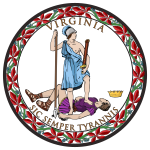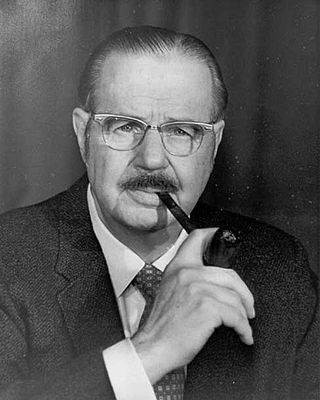
Hugh Doggett Scott Jr. was an American politician. A member of the Republican Party, he represented Pennsylvania in the U.S. House of Representatives from 1941 to 1945 and from 1947 to 1959 and in the U.S. Senate, from 1959 to 1977. He served as Senate Minority Leader from 1969 to 1977.
These are tables of congressional delegations from Virginia to the United States Senate and United States House of Representatives. Virginia's current U.S. Senators are Democrats Mark Warner and Tim Kaine. Virginia is allotted 11 seats in the U.S. House of Representatives; currently, 6 seats are held by Democrats and 5 seats are held by Republicans.
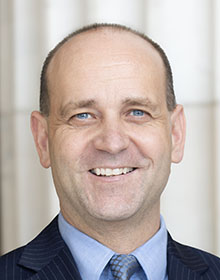
The clerk of the United States House of Representatives is an officer of the United States House of Representatives, whose primary duty is to act as the chief record-keeper for the House.

John Albert Carroll was an American attorney and politician who served as a Democratic United States Representative and United States Senator from Colorado. He also served as a special assistant to President Harry Truman.

Colorado's 1st congressional district is a congressional district in the U.S. state of Colorado based primarily in the City and County of Denver in the central part of the state. The district includes almost all of the City and County of Denver and the Denver enclaves of Glendale and Holly Hills. A small portion of the City and County of Denver near Four Square Mile is located in Colorado's 6th congressional district.

Virginia's 10th congressional district is a U.S. congressional district in the Commonwealth of Virginia. It is represented by Democrat Jennifer Wexton, who was first elected in 2018.

The United States House of Representatives elections in California, 1946 was an election for California's delegation to the United States House of Representatives, which occurred as part of the general election of the House of Representatives on November 5, 1946. Republicans captured control of Congress for the first time since 1928 due to the extreme unpopularity of President Harry Truman. California was indicative of the results as Republicans gained seven seats, one of which was won by a recently returned WWII veteran named Richard Nixon. Democrats would not regain a majority of the delegation until after the 1958 election.

The 1960 United States Senate election in West Virginia was held on November 8, 1960. Incumbent Democratic U.S. Senator Jennings Randolph won re-election to a full term. Defeating Republican Governor Cecil H. Underwood in a landslide
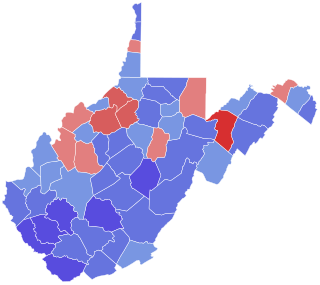
The 1966 United States Senate election in West Virginia was held on November 8, 1966. Incumbent Democratic U.S. Senator Jennings Randolph won re-election to a third term and a second full term.
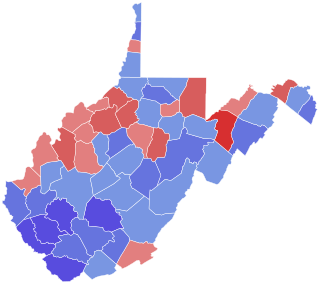
The 1954 United States Senate election in West Virginia took place on November 2, 1954. Incumbent Democratic Senator Matthew M. Neely was re-elected to a fifth term in office.

The 1996 United States House of Representatives elections in Virginia were held on November 5, 1996 to determine who will represent the Commonwealth of Virginia in the United States House of Representatives. Virginia has eleven seats in the House, apportioned according to the 1990 United States census. Representatives are elected for two-year terms.

The 2002 United States House of Representatives elections in Virginia were held on November 5, 2002, to determine who will represent the Commonwealth of Virginia in the United States House of Representatives. Virginia has eleven seats in the House, apportioned according to the 2000 United States census. Representatives are elected for two-year terms.

The 2004 United States House of Representatives elections in Virginia were held on November 2, 2004 to determine who will represent the Commonwealth of Virginia in the United States House of Representatives. Virginia has eleven seats in the House, apportioned according to the 2000 United States census. Representatives are elected for two-year terms.

The 1998 United States House of Representatives elections in Virginia were held on November 3, 1998, to determine who will represent the Commonwealth of Virginia in the United States House of Representatives. Virginia has eleven seats in the House, apportioned according to the 1990 United States census. Representatives are elected for two-year terms.

The 1966 United States Senate election in Virginia was held on November 8, 1966. Senator A. Willis Robertson ran for re-election to a fourth term in office but was defeated in the Democratic primary by State Senator William B. Spong Jr. Spong then defeated Republican James Ould and Independent F. Lee Hawthorne in the general election.

The 1946 United States Senate election in Virginia was held on November 5, 1946. Incumbent Senator Harry F. Byrd Sr. was re-elected to a fourth term after defeating Republican Lester S. Parsons.

The 1940 United States Senate election in Virginia was held on November 5, 1940. Incumbent Senator Harry F. Byrd Sr. was re-elected to a second term after defeating Independent Hilliard Berstein.

The 1946 United States Senate special election in Kentucky was held on November 5, 1946, to complete the unexpired term of Senator Happy Chandler, who resigned to become Commissioner of Baseball. Interim Senator William A. Stanfill did not run for the full term. Republican John Sherman Cooper defeated Democratic former U.S. Representative John Y. Brown to complete the term.

The 1972 United States Senate election in New Hampshire took place on November 7, 1972. Incumbent Democratic Senator Thomas J. McIntyre won re-election to a third term. Democrats would not win this seat again until 2008. This was the first time Democrats were popularly re-elected to any Senate seat in New Hampshire.
